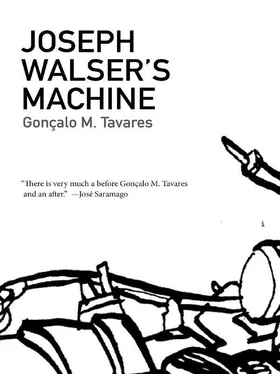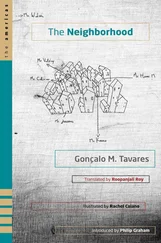The night would no longer be normal. Confusion had invaded the few hours that the dice players had previously managed to protect from the century going on in the outside world. You can’t escape the century, each of the men must have thought, at the moment when the eight soldiers pointed their guns at each of their terrified human heads.
Months after the execution, Joseph Walser passed by Fluzst’s widow in the street. The city had been through so many disturbing days that this one tragic, albeit limited, individual event seemed, even to the people closest to it, to have appeared and disappeared many years before.
“How have you been?” Walser greeted her politely.
Fluzst’s widow had stopped wearing her mourning clothes some time ago. She was wearing a long, gray skirt from which projected a robust feminine backside; her breasts were also ample. Clairie had gained a few pounds since the “event,” as everyone, out of a sense of propriety, called Fluzst’s execution (or occasionally as: “the thing that happened”); those ample breasts seemed to want to escape from the inside of her white shirt, and caused some intense disquiet in Walser.
Clairie was a woman who had always stimulated his curiosity. She was extremely circumspect, said very little, only what was necessary, responding solicitously to any request her husband made; aside from all this, Clairie played an important role on the nights when they held the game in which Walser had participated for years.
Any of his previous, more prolonged glances at her had, nevertheless, been filtered through and annulled by a situation that was completely different from the present one; a fixed situation, one could call it, a situation that, in and of itself, didn’t give any indication of the changes which were imminent, and thus presented itself to Joseph Walser as an eternal situation; a situation in which this woman — Clairie — the wife of the man of the house — the aforementioned Fluzst — often brought a bottle of homemade wine into the game room, which reinvigorated the players and allowed for a small interruption of the greed that gradually took hold of them through the evening. It was the entrance of a woman into the room, together with the wine, let’s say, that allowed for a certain emotional restraint to be practiced, in the game. The instinctual and borderline dangerous avarice that accumulated with each roll of the dice was suddenly diverted in another direction, thanks simply to the introduction of a feminine element into the space. A strong, unexpected downpour on a day when the forecast had called for mild weather wouldn’t produce a greater surprise than the one brought about by the entrance of this woman, Clairie, into the game room. She was the conspicuous infiltration of another world, a prompt reminder that the outside world never failed to send to the five players. Her entrance halfway through the game, with wine and sometimes pieces of bread, in spite of her discretion, her reticence, was like an indication that there was still a war on, in that it represented, for the players, an “awakening.”
However, the situation was now completely different. It was fixed in a new way, a new eternity seemed to have been established: the woman was now a widow; which is to say that the woman — Clairie — no longer had a man at her side. And she was still young, this woman who passed by Walser on the street on that late afternoon, wearing a white blouse, not transparent, but a blouse in which her breasts were, so to speak, a powerful element, an element that disturbed the unequivocal way that Walser tended to look at her. The contour of her especially robust right breast, due to some oversight or impulsive movement on her part, was now faintly visible; this contour became an obsession for Walser.
“Are you still working in the clerks’ office, Mr. Walser?”
Joseph responded by nodding his head and smiling. Clairie also worked for a company owned by Leo Vast. During the day, the two of them went through the same sorts of movements and followed the same sorts of ritual.
“Companions in slavery,” joked Walser.
Clairie smiled.
After a few brief words, Clairie said good-bye. Joseph Walser didn’t move a single foot forward; he turned around and stood watching the movement of Clairie’s buttocks as she walked away. Without spending even a second on formulating a plan, Walser, excited, took a few small, quick steps toward Clairie (while at the same time instinctively hiding his deformed right hand at the side of his body) and called out to her, in a tone of voice that, in a different situation, would have filled him with shame.
“Ms. Clairie!”
Clairie stopped and turned around. She smiled.
“Yes?”
Walser was absolutely overwrought and, sensing some encouragement in her smile, whispered:
“Ms. Clairie, I need to say something to you, something that I’ve kept hidden for a long time. Something that has to do with my affections, Ms. Clairie, something that has to do with powerful feelings.”
“Behave yourself, Mr. Walser. We’re in the middle of the street,” said Clairie. “Certain things should never be said to a woman regardless of the situation, much less in this one. My husband just recently died, and you, sir, were one of his friends. I’m still in mourning.”
And then, suddenly, she asked:
“Mr. Walser, why didn’t you show up for the game that night?”
Walser didn’t respond. Clairie turned around and quickly walked away.
“Stupid woman,” murmured Joseph Walser, before taking one last look at the movement of Clairie’s buttocks.
Meanwhile, two soldiers came up to him.
Joseph straightened his posture, proceeded to perform a protracted and respectful gesture in their direction, and only then started off again.
The danger of the current situation had a visible effect on the suppression of individual personalities — in their prominence. “Any man who lets himself get too close to current circumstances,” Klober sometimes said, “might end up engaged in the conversation.”
Every event that became fixed in one’s individual memory was, for Klober, nothing less than the remote consequence of a balancing act: you see, the acts of living beings, beings endowed with a degree of intellectual willpower, so to speak, either interfere with immovable objects, or not; and from this interaction between two worlds there must follow a specific result, naturally, an objective effect that — if only there were methods for measuring practical experience scientifically, methods as refined as those that operate in certain laboratories — could even be expressed by a concrete, a precise number, one that would be immediately understood everywhere. But since such was not the case — that is, since individual perception resists codification into an objective science able to observe and explain its inner workings, each individual memory remains just that: individual, different from any other; indeed, marked by a retreat from others. If a collective shared the exact same memory, it wouldn’t be a collective; it would be a single unit of existence. Therefore, to speak about the collective memory of a nation is simple foolishness — but is, at the same time, an excellent political strategy. The History being taught to children was obviously an attempt to establish a formula dictating the organization of memory in those young minds: one that was both limited and quantitative. Learning the History of a country means — if you’re paying attention — losing your individual memory. “It’s being taught History that first begins to destroy a citizen,” said Klober. “It’s no surprise that not a single genius has been born in the last fifty years: who can be creative, truly creative, when he is inebriated with History from an early age?
Читать дальше












